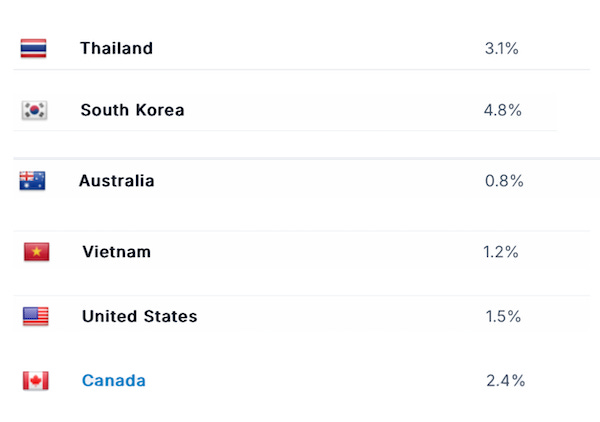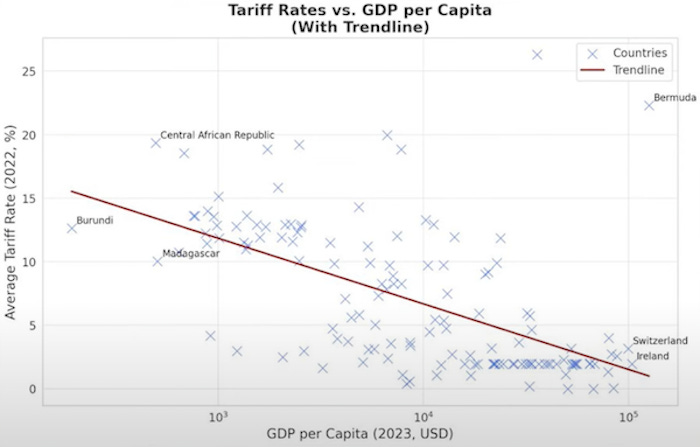This was the stock market reaction to Trump's tariff announcement. It was the biggest two-day loss in history. Some would say, "Who cares about the stock market? It's a rich man's game." Not so anymore, because the average person has some stocks, and anyone with a pension fund will have a portion of those funds invested in the stock market. So, it has real-world implications, and the stock market is just a reflection of sentiment about the economy and where it is going.
Before anyone jumps on my case and says I have Trump Derangement Syndrome, I should say I supported Trump and his domestic policies, such as border control and tough stance on crime. However, we should be mature enough to criticize counterproductive policies, even if it's someone we support. I have previously stated that his continued support of Operation Warp Speed is wrong. Now we come to this tariff policy which could be disastrous. Some of his supporters are even raising their eyebrows.
If you believe Trump about tariffs, then America is a poor victim. I'm surprised to see a positive person like Trump play the victimhood card. If America is really getting ripped off by everyone, there is a simple solution. Pull American bases out of all the overseas countries; Turkey, Japan, South Korea, and Australia. Not too many Australians would shed a tear if that happened. Here, as in many countries, Trump is creating animosity. Australians have been staunch supporters of America and what it stands for. However, loyalty only goes so far. I know Canadians are similarly outraged. Who cares, you might say? But whether you like it or not, we are in a global world where trade affects everyone.
While Trump is at it, he should stop trade altogether. After all, America doesn't need the rest of the world, or does it? Trump's thinking is fallacious. I'll give you a concrete example.
When I came to Australia in 1980, it was a very protectionist country. To protect its own car industry, it imposed high tariffs on imported vehicles. You rarely saw an American car because it was so expensive, in many cases two to three times the actual U.S. price. The same was true for foreign appliances. It was basically protection for high-priced Australian wages. At the time, however, there was little of the technology that we have today.
By 2010, Australia phased out all tariffs on motor vehicles in trade agreements with the U.S. and other countries. The result was the loss of car production in Australia, which significantly reduced car prices. In fact, American cars are everywhere now in Australia and are affordable to middle-income families. I own two 'American' cars. One of them, the Ford Mustang, is 100% built in America, although some components come from Canada. The other, a Ford Mondeo, was not built in America but in Europe. Tesla, that iconic American EV, has the largest car plant in the world in China.
The fact is that we live in a global marketplace, and getting into a tariff war is very counterproductive. A lot of the cost structure of many products involves technology, from microchips to other computerized components. A modern vehicle has so many luxuries, what we now consider necessities like navigation systems, climate control, airbags, blind spot sensors, and so on. This has happened at prices that people can afford. The same goes for your modern fridge or oven. Low tariff regimes allow companies to have greater efficiency.
A trade deficit with a country does not equate to being ripped off. Many of the countries that America has a trade deficit with are poor, and the reason America imports those cheaply priced goods is to allow its citizens to have those goods easily available. Also, guess what? Buying goods keeps the economy humming, allowing people to have jobs, which means the government receives tax receipts.
A car built in America may have components from overseas, but when an American purchases that car, there is a tax included in the price of the vehicle. The salesperson who sells the vehicle earns income on which he pays tax, and the car company pays company tax. That's how it works.
In fact, except for a few examples, America has no reason to impose tariffs. Tariffs are a tax on consumers. The major ripoff for America is the uncontrolled government spending and money printing that has been a feature for the past 30 years. That is the reason for the out-of-control $36 trillion debt and repeated budget deficits.
The chart that Trump displayed on "Liberation Day" is false. The chart he displayed shows tariffs charged by other countries. Here is an example for Thailand.
So what did the chart show as Thailand's tariffs on U.S. goods? 72%. The balance of trade is not the rate of tariffs charged.
So, I went to several sources, the WTO, Reuters, World Population Review, and Macrotrends, to look at the actual average tariff rates for every country in the world. Here are the rates for the countries that Trump feels are ripping off America.
Again, the U.S. has large trade deficits with some of the poorest countries because the importation of cheaply priced goods from these countries allows American consumers to have a plethora of goods, which enhances economic activity. When it comes to Australia, the U.S., with its trade surplus, actually charges slightly higher tariffs than the land down under. So why the imposition of higher tariffs on some Australian goods now?
As the following chart shows, there is an inverse relationship between Gross Domestic Product and tariff rates. Thanks to Ben Shapiro for this.
There is a better than 50% chance that America will sink into a recession this year. Costs will rise to compensate for the large increase in tariffs, and both consumers and manufacturers will pay the price. Historically, tariff wars have been a disaster.
Targeted tariffs can play an important role in national security. Countries that are aggressive and a threat should be punished by the imposition of tariffs, but friendly nations that engage in bilateral trade should not be targeted.
Suppose these tariffs remain for a lengthy period. In that case, China will win because those lower-income Asian countries will hitch themselves to Beijing.






Donald Trump first made this claim back in 1987, and it is possible his intellectual development stopped way back then, and he is stuck in an anachronistic time warp from the past, with reasoning that might have applied then. So he may have seen the light, but it was a long time ago. He is a weirdo, and time will tell.
" It was the biggest two-day loss in history."
Ely you are way too smart to have mistaken these last two days as the biggest loss in history. I lived through Black Monday Oct 19, 1987, when the Dow Jones Industrials plunged nearly 23% in one day. The S&P500 (the market) is down 10% over the last 2 days. Not even close to the largest loss in history